In a previous story, I provided some strategies for keeping costs low while using the public DC fast charging infrastructure, but I want to focus specifically on the costs I’ve actually paid in my Chevy Bolt EV. In this story, I will compare my last twelve DC fast charging sessions on each of three public charging providers: ChargePoint, Electrify America, and EVgo. I’ll share some details about my use cases, membership statuses, and driving efficiency. In addition, I’ll call out some specific charging sessions that are either outliers or provide interesting insights.
I consider ChargePoint, Electrify America, and EVgo to be the three major, nationwide public charging networks, though I haven’t established a strict definition for what that might mean. On a basic level, the charging providers need to be open to all-electric vehicle owners (hence, why the Tesla Supercharger Network is not discussed here), and they need to have a wide presence in most U.S. states.
These three networks each have several hundred sites across the United States, and although ChargePoint and EVgo only cover a few travel corridors, their chargers can be found in most major U.S. cities. Electrify America has taken a broader approach, and just over a year, they went from breaking ground on their first charging site to hosting a network that is a quarter of the size of Tesla’s U.S. Supercharger network. The only other public charging provider that might potentially qualify for this list is GreenLots; however, they are underrepresented in my region, and as a result, I do not use them frequently enough to gather the data needed for this story.
DC Fast Charging Is Not Representative of Typical Charging
Before I get started, I do want to emphasize that this story is focusing solely on the DC fast charging costs as isolated events. These chargers are typically only used on longer trips that represent a small portion of most people’s overall driving, and even on those longer trips with multiple fast charging sessions, much of the costs are offset by starting the trip with a full battery and recharging overnight at hotels and motels where charging is a free perk with the room. Each of those overnight charges to full would offset two DC fast charging sessions, and they typically cost as little as 2 or 3 cents per mile, which is a fraction of what the best internal combustion cars cost to drive.
In addition, I’ve adjusted the cost per mile based on the efficiency that Chevy Bolt EV owners will typically see while traveling. It’s quite easy for Bolt EV owners to see extremely high efficiency while putzing around town. I myself often play efficiency games where I attempt to get my Bolt EV up to Lightyear One efficiency; however, on high-speed freeway trips, 3.5 mi/kWh efficiency is a more reasonable expectation.
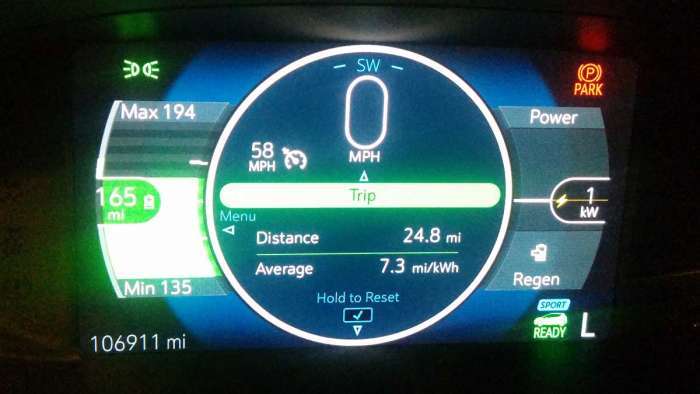
Essentially, the cost for driving an electric car overall will be far lower than these rare charging events. I am a very high mileage driver, which is the only reason I use DC fast chargers as often as I do. Even though I have been able to log dozens of DC fast charging events in the last few months, many electric vehicle owners can go a year or more without ever using the public fast charging infrastructure.
ChargePoint
ChargePoint is a nationwide charging provider; however, their network is unique. They are primarily focused on their billing and software systems, and unlike Electrify America and EVgo, ChargePoint doesn’t actually own a lot of the hardware (the actual charging stations) that they have deployed. In fact, ChargePoint has just recently started building their own charging hardware (ChargePoint express), which they are now selling to clients with their billing and service plan.
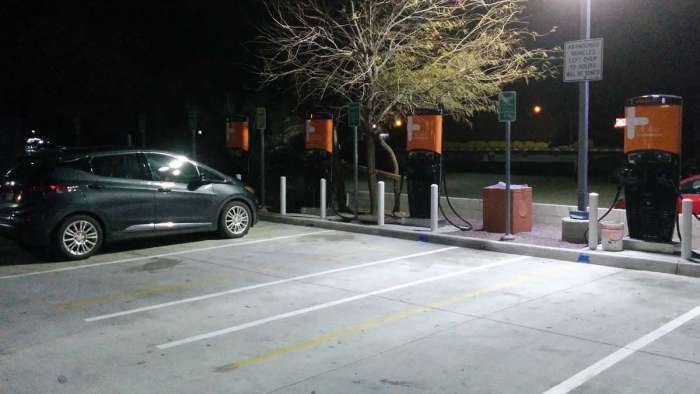
ChargePoint is criticized quite often for not maintaining their equipment, but the reason for that is, despite having the ChargePoint labels and billing network, much of that equipment isn’t theirs. If the station owner didn’t buy a service plan, ChargePoint is under no obligation to fix it, and many times when ChargePoint Chargers stay broken for extended periods of time, it’s because the station owner couldn’t afford a technician to come out and fix it. On a side note, GreenLots operates in the same way as ChargePoint, which again accounts for why so many of their chargers sit broken and unfixed for long periods.
Because of the way ChargePoint’s network functions, the pricing across their network is very inconsistent. In fact, a number of their chargers are actually free to use, and some have very generous pricing scales. For this article, I’ve actually omitted the recent free ChargePoint sessions. This is partly because several of those chargers were new, and ChargePoint will soon start charging for their use. However, the other reason for focusing on the paid stations is that these are still the most prevalent, so I’d rather set that expectation. If an EV owner pulls up to a free charger, well, that’s just a bonus.
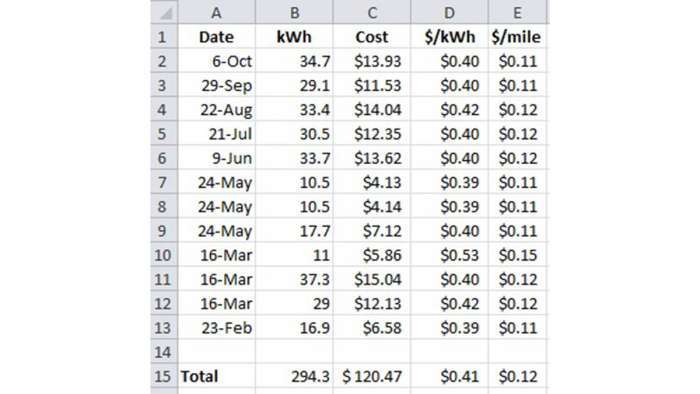
The first thing that might jump out at you is that the cost per mile. Based on EPA estimated range, the cost per mile would be a bit lower; however, these chargers are primarily used on freeway trips where the Chevy Bolt EV’s efficiency is typically far less than it is during local driving. In my experience, the Bolt EV averages about 3.5 mi/kWh on 70 mph freeways.
Again, though, these sessions only represent a portion of the driving that I did on any given trip, and some of these charging events don’t tell the whole story. That being said, I do think that ChargePoint needs to reassess some of its fee structures (or advise their clients to adopt different fees), and I’ll call those out specifically here.
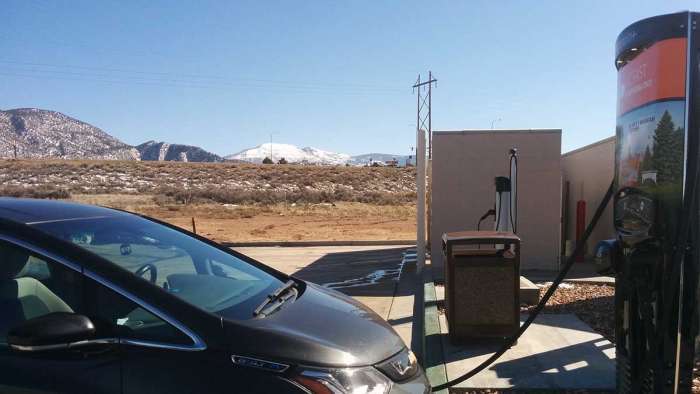
The session that stands out the most is the March 16 session where only 11 kWh was added for a cost of $5.86. This event was particularly egregious because the ChargePoint chargers sponsored by UCAIR (Utah Clean Air Partnership) have a $2 session fee and charge 35 cents per kWh. Essentially, the longer the session goes, the lower the price will be, but they will still be relatively high. All three of the March 16 sessions were on these UCAIR ChargePoint units, and they are among the most expensive sessions.
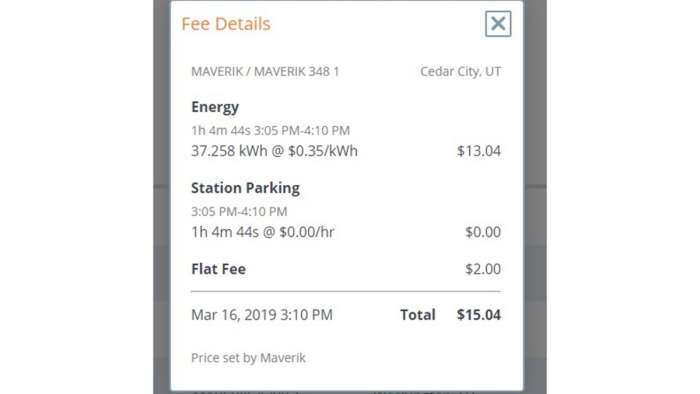
In the case of the session where I paid 53 cents per kWh, the thing to consider is that I had just returned from Bryce Canyon (over a 160 mile round trip with no opportunity to charge), and I still had 40 miles to get back to my motel, which had free charging with my room. Basically, the $2 session fee made up nearly half of the total cost of the charging session, but it was just a sunk cost.
I really do think that ChargePoint and UCAIR are going to need to rethink their pricing structure in that area now that the entire Interstate 15 route between Las Vegas and Salt Lake City is populated by Electrify America chargers (you’ll see their pricing below).
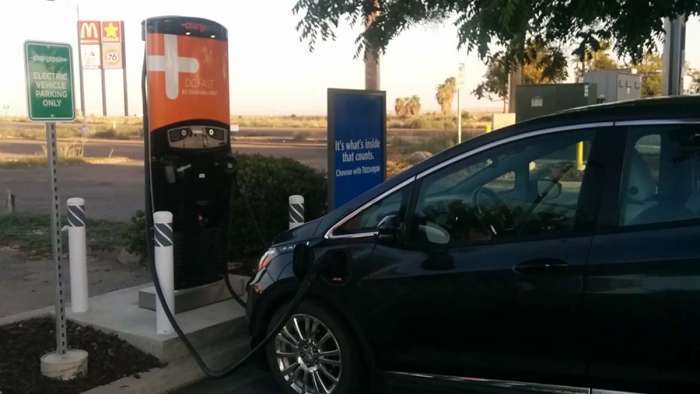
The other ChargePoint sessions are still high, but they are a bit more consistent with pricing. Most of these sessions occurred on ChargePoint chargers that were built with California Energy Commission (CEC) grant funding, and it is my understanding that ChargePoint does actually own these chargers (a switch from their typical model). For their current pricing model, ChargePoint has decided to charge a 25 cent per kWh flat rate (that’s good), but they’ve added on an additional 10 cent per minute fee.
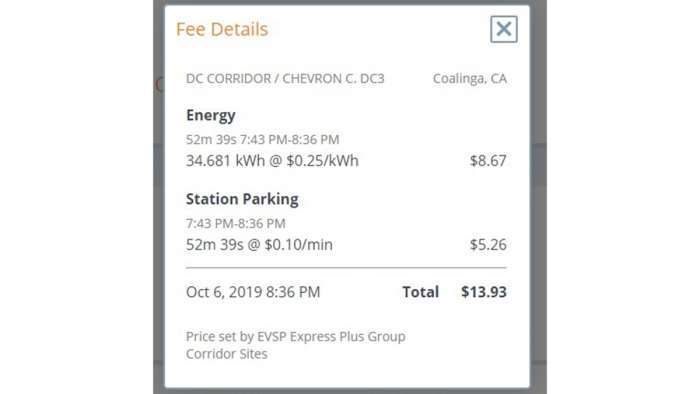
As I’ve mentioned in previous stories, I fully support a per minute fee structure, but only if it makes sense. In this case, it doesn’t. ChargePoint is able to initiate a per minute fee after a set period, and I think that would be more appropriate here. They could even increase the cost per kWh, and it would still be more beneficial to EV owners. In my opinion, ChargePoint should charge 30 cents per kWh and a 10 cent per minute fee starting after 30 minutes. It wouldn’t be a huge difference, but it would save conscientious EV drivers a decent amount of money.
Electrify America
Electrify America is the newest of these three charging providers, and their network is being built out in four cycles broken up over 10 years. The buildout is being funded by VW as penance for their #dieselgate scandal (VW was caught cheating emissions tests on their diesel cars), and it is by far the most rapidly expanding network in the United States.
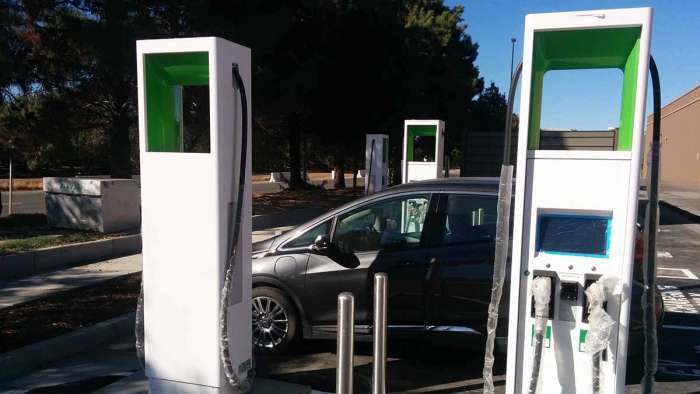
When Electrify America first opened their network, they had one of the worst pricing structures of any public charging provider, and because first impressions are lasting, they’ve carried that stigma with them. However, the reality at this point is very different. Not only is Electrify America the cheapest public charging option, for certain electric vehicles (such as the Chevy Bolt EV), it can actually be cheaper than what many Tesla owners now pay to use the Supercharger Network.
Looking at my charge history for Electrify America, it creates a stark contrast with the prices I was paying on ChargePoint chargers. One additional consideration, though, is that I am a full member of Electrify America, so I actually pay an additional $4 per month in addition to these fees. Because these charging sessions are broken up over four months, my actual costs include an additional $16. That sum increased my average cost per kWh to 27 cents and my average cost per mile to 8 cents. So even with the monthly membership, Electrify America costs about a third less than the ChargePoint network.
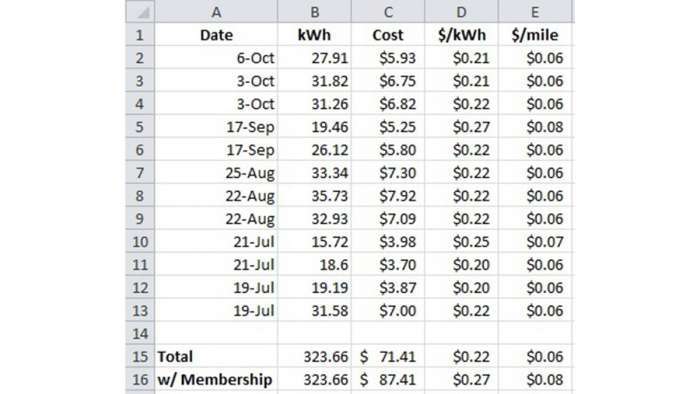
Even though this story is sharing a historical record of my last twelve charging sessions on each of these three networks, what you’ll notice is that most of my recent charging sessions have happened on Electrify America chargers. This is because it has become my new favorite network. Not only have I had a 100% success rate – I’ve always been able to activate a charge – at their sites (this is something that no other provider can claim), they are both faster and cheaper than all the other public charging options. And I can’t emphasize the speed difference enough. Shaving nearly 10 minutes off of every charging stop on a long trip does add up.
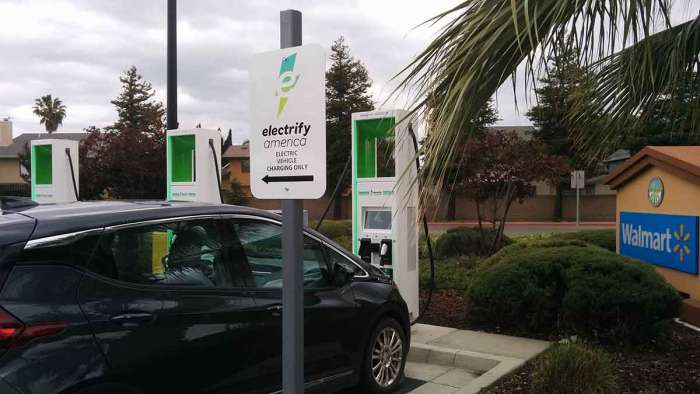
In addition, Electrify America chargers are – for the most part – better placed for travel than most ChargePoint and EVgo locations. Placement is actually a huge deal for these charging networks. DC fast chargers are primarily used for travel, so the closer these sites are located to major corridors and freeways, the better. When chargers are located less than a quarter mile off the, it freeway saves a lot of time while traveling.
EVgo
EVgo is the oldest charging provider on this list, and it is actually the largest fast charging provider in the United States by site count. They host over 750 fast charging sites across the country, which is actually a larger site count than even the Tesla Supercharger Network. Unfortunately, while their site count and distribution good, EVgo’s charging sites tend to be smaller (usually two or fewer DC fast chargers) and slower (typically 50 kW or slower).
In a very similar way to Electrify America, EVgo got its start as a settlement. In 2012, NRG was required to invest $102.5 million to build electric vehicle charging infrastructure across the state of California.
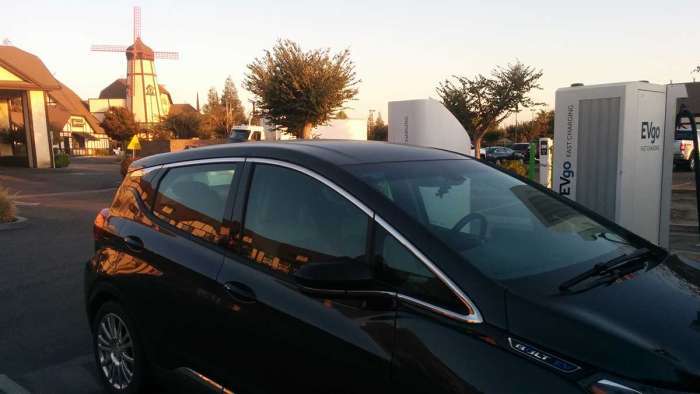
Since that time, EVgo has rapidly expanded, and they’ve sought out funding from far more sources than just that original NRG settlement. Also similar to ChargePoint, EVgo has won CEC grants to build charging corridors in California, and EVgo has also won a number of bids to build charging sites and corridors across a number of U.S. states. As an example, EVgo also received VW settlement money that it will use to build a statewide charging network in Virginia. EVgo has also maintained a strong partnership with a number of automakers. For instance, Nissan recently partnered with EVgo to fund 200 new 100 kW fast chargers.
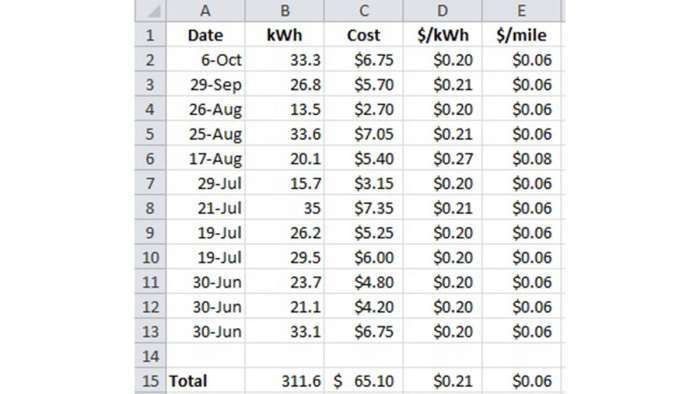
When I was first running the numbers for my EVgo usage, I thought my totals would have been higher; however, I forgot that I had won a major award. Last year, EVgo ran a sweepstakes for suggesting new charger sites (I think EVgo is actually building some new sites based on a few of my suggestions), so I don’t pay membership fees, and I’m locked into a 15 cent per minute rate.
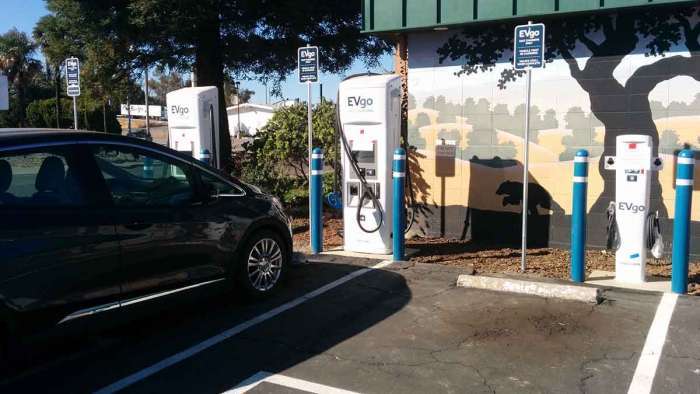
What’s interesting to me, however, is that despite the fact that my EVgo account’s per minute rate is less than half of EVgo’s published per minute rate, using EVgo chargers costs me roughly the same amount as Electrify America chargers. That means that, for the average electric vehicle driver, the EVgo network will cost nearly twice as much to use as the Electrify America network, or about the same as using the ChargePoint network.
Also, much like ChargePoint, most of EVgo’s chargers are significantly slower than Electrify America’s chargers, so even though EVgo chargers cost me roughly the same amount of money as Electrify America’s chargers, I will prioritize the latter because I am also saving time charging.
One final quirk about EVgo is that they are the only charging provider to use timed sessions. Essentially, regardless of whether you’re a paid member, your session will time out after a set period of time. To me, that has always been restrictive because the session times in conjunction with the speed of most of EVgo’s chargers do not align with the needs of modern, larger battery electric vehicles. EVgo did increase the base session length for all members from 30 minutes to 45 minutes, which helped a little; however, even 45 minutes on a 40 kW to 50 kW charger is not always enough.
For example, if I arrive with 5% to 10% battery in my Bolt EV, by the time I come back from dinner, the charging session might have automatically stopped before the Bolt EV was even 65% full. That can be frustrating, especially to new electric vehicle owners who don’t realize that the session will time out.
Conclusion
At this point, for me, there’s no real price difference between using Electrify American and EVgo chargers in the Chevy Bolt EV. As long as the charger’s speed aligns with my intent for the stop, it doesn’t matter which I use. When my promotional EVgo membership transitions back to the standard EVgo membership, however, my costs will increase significantly. At that point, I will most likely use Electrify America almost exclusively.
For Bolt EV owners who do not have my promotional EVgo membership, Electrify America is a clear winner in the public charging space. Sure, you can maintain a ChargePoint membership because it doesn’t cost a monthly fee, but I suggest checking the pricing structure for the station to see if it matches your expectations first.
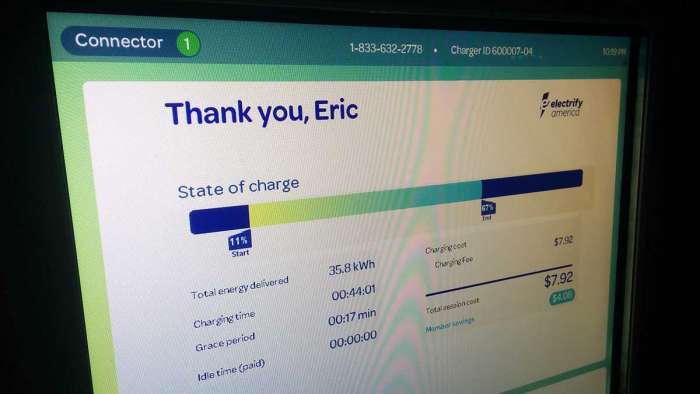
As standalone sites, it’s abundantly clear that these charging stations are not profitable; however, I feel that these networks do need to work on and adjust their pricing. Electrify America seems to currently be the sweet spot for Chevy Bolt EV owners, though the way Electrify America structures their pricing tiers based on charging rates, it does leave some electric vehicle owners out in the cold. If Electrify America were to transition to a per kWh model, they could then charge a similar 22 cents per kWh plus their $4 per month membership fee. For non-members, perhaps the price increases to 26 or 28 cents per kWh with their $1 session fee.
Likewise, ChargePoint’s CEC sites that charge 25 cents per kWh are also acceptable if they drop the 10 cent per minute fee from the first 30 minutes of the charging session. The $2 upfront session fee and charging per kWh on ChargePoint’s UCAIR sites, however, encourage electric vehicle owners to occupy the charger for as long as they can, which isn’t acceptable for a highway charging site with only one DC fast charger.
Finally, EVgo is the most in need of an adjustment. Of these three charging providers, EVgo has the least consistent charging speeds across their network, yet they maintain a per minute pricing model with sessions that time out after 45 minutes to an hour. In my opinion, EVgo would be much better served to adopt a per kWh fee structure that they could adjust by region, and to encourage electric vehicle owners move on in a timely manner, they could add a session fee. If an EV owner’s session times out after 45 minutes, paying an additional $1 upfront each time they activate a session might discourage them from staying at the charger too long.
See you next time as I debunk some of the most common Chevrolet Bolt EV myths!
About The Author
Eric Way focuses on reporting expert opinion on GM brand electric vehicles at Torque News. Eric is also an instructional designer and technical writer with more than 15 years of writing experience. He also hosts the News Coulomb video blog, which focuses on electric vehicles, charging infrastructure, and renewable energy. Eric is an active member of the EV Advocates of Ventura County, a volunteer organization focused on increasing the widespread adoption of electric vehicles. You can follow Eric on News Coulomb

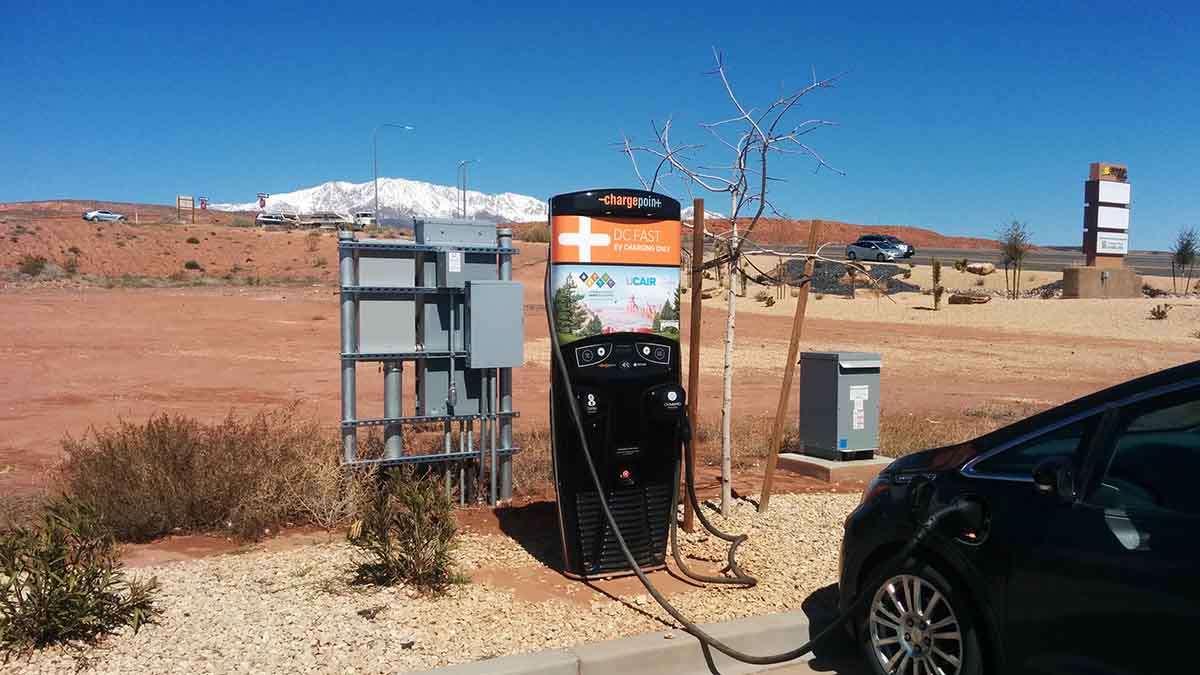




Comments
Great series of articles Eric
Permalink
Great series of articles Eric. Glad to see you posting text as well as videos. Following your last post on charging costs, I posted my own take on what it costs to charge a Bolt.
Paul
Not sure how you wound up
Permalink
Not sure how you wound up with 3.5mi/kWh. I drove my Bolt to Vegas and return in August (>105° ambient, lots of a/c) I drove at 73mph indicated (probably 71 mph actual) and I averaged 4.0mi/kWh for the round trip (>500 miles). Not sure if the fact I have a 2019 as an impact on that, but I think 500 miles with zero net elevation change (but with several major elevation changes enroute) is a representative test.
Great Article but you fail to
Permalink
Great Article but you fail to recognize that in all states the Public Utility Commission or its comparably named entity regulates the way electricity is sold. Charging Networks are often defined by regulation as "Utilities" since they sell electricity to the consumers. These government entities regulate how electricity is sold by saying by Kwh or Time based charges for a defined current rate and sometimes with amount limits. This is why networks like Tesla and Electrify America have different rates in different states. It is also why they have difficulty getting permits in some states like Arkansas, North Dakota and Montana which are unfriendly to EVs.
As someone that does several
Permalink
As someone that does several thousand mile trips quite often in my bolt. I would say this article is an accurate reflection of what to expect.
EA has also become our go-to chargers of choice, it's cheaper, faster, more dependable. The app and subscription was the game changer for EA.
EVgo is dependable, but times you out and is expensive.
Chargepoint very hit or miss, last time I tried to use one was back in June and it was broken. But like EVgo, they are slower and more expensive than EA so I don't even bother with them unless I'm desperate.
Great article on the CCS fast
Permalink
Great article on the CCS fast charge. I'm amazed that the cost of EVGo and EA are comparable to the Supercharger network. Great explanation about how the Chargepoint network operates as well. I often get confused as many Chargepoints are free and some are not. I've found that paid level 2 Chargepoints are ridiculously expensive. As a Tesla owner who deives 3-4k miles per months I was contemplating of getting a chademo adapter to use 50 kW charging, but after reading your article it's an astounding no in my mind now.
I've been to suggesting to my fellow Bolt owner friend to trade in hir Bolt for a M3 SR+ to which he always vehemently protests. After recently taking a road trip changed minds and said he needs a Tesla now. He cried about how frustrating the Chargepoint stations were about them being non functional as you stated. Also how could not get a full charge on the EVGo with the 45 min time out. EVGo could remedy this by doing a 80% charge limit when stations are 50% full and then have a parking fee when charged to 80%.
Electricity reates are not
Permalink
Electricity reates are not 'static' - they vary by season, demand and TOU. There's no discussion whatsoever in this article on weekday Super-Peak kWh rates between 4pm to 9pm (June through September) in California nor demand charges incurred by commercial customers on TOU-GS tariffs making this article moot. I have seen utility bills where 67% (sixty-seven percent) of a monthly bill was demand charges.
So, after trying to wade
Permalink
So, after trying to wade through this eye-crossing article, it basically confirms the for-profit EV charging companies' L3 chargers are a total and complete ripoff, and basically get a Tesla or a Leaf that can access free L3 Chademo units at local Nissan dealers. If you have a Bolt you're at the mercies of the charging companies because GM dealers dont offer L3 stations at dealerships. Not good.
I found the article quite
Permalink
In reply to So, after trying to wade by Spector (not verified)
I found the article quite clear and EA rates low and the charge quite fast. ( comparable to Tesla) The only thing I would have found additive to the post would be an extra column showing time spent to receive the Kwh shown.
Most charging is done at home regardless.